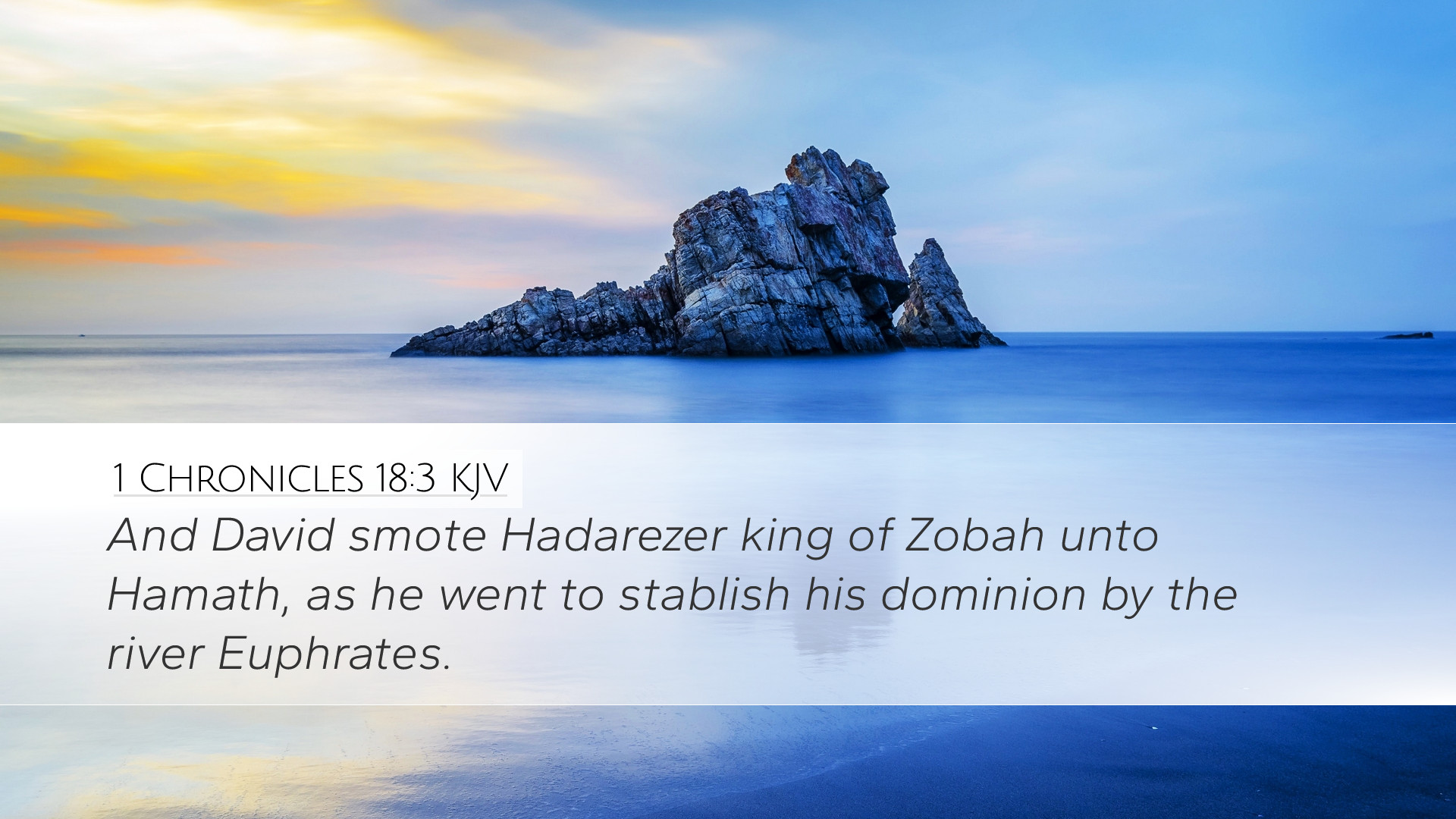Commentary on 1 Chronicles 18:3
Verse Context: 1 Chronicles 18:3 states, "And David smote Hadadezer, the son of Rehob, king of Zobah, as he went to recover his border at the river Euphrates." This verse records an important military victory of King David over Hadadezer, signifying the expansion of Israel's territories during David's reign.
Historical Background
The narrative leading up to this moment is steeped in the context of David's ascendance to the throne and his consolidation of power. After years of conflict and the tumultuous transition from Saul’s kingdom to his rule, David achieved a series of military successes that established Israel as a dominant regional power.
Commentary Insights
Matthew Henry's Commentary
Matthew Henry emphasizes David's military prowess and the divine favor that underpinned his victories. He suggests that David's success in overcoming Hadadezer was a manifestation of God’s promise to establish David’s kingdom. Henry notes that Hadadezer was a formidable opponent, akin to a regional powerhouse attempting to regain lost lands. This battle exemplifies the fulfillment of God's covenant with David, as the Lord would make his enemies a footstool under his feet.
Albert Barnes' Notes
Albert Barnes focuses on the geographical implications of this verse. He identifies Zobah as a significant kingdom to the north of Israel, which had threatened Israel’s security. Barnes explains that Hadadezer's attempt to recover territory near the Euphrates River was a strategic move, given that this river served as a vital boundary. His commentary underlines the importance of David's military strategy, asserting that the victory over Hadadezer was not merely a benefit of strength but hinged on discerning God’s will and guidance.
Adam Clarke's Commentary
In his analysis, Adam Clarke underscores the importance of David's leadership during this campaign. He elaborates that Hadadezer was likely a pawn of larger regional powers, and thus David’s victory was crucial in dismantling a significant alliance against Israel. Clarke also elaborates on the implications of the battle for the socio-political landscape of the region and implies that this victory would have bolstered the morale of David’s troops and the nation as a whole. Clarke notes that this event set a precedent for subsequent military encounters and established David's reputation as a military leader.
Theological Implications
This verse, while recounting a historical event, also carries rich theological implications:
- The Sovereignty of God: The victory signifies God’s control over the nations and history. David's military successes are evidence of divine providence in fulfilling His covenant to the Israelites.
- Divine Favor: The victories of David indicate that when one aligns their actions with God’s purpose, success often follows. This serves as a vital lesson for leaders today, encouraging them to seek divine direction in their endeavors.
- Leadership by Example: David's actions as a leader who goes into battle alongside his men reflect a model of leadership based on courage and commitment. This exemplifies pastoral leadership today as being actively engaged in the struggles of their congregations.
Practical Applications
The themes emerging from 1 Chronicles 18:3 present several applications for contemporary readers:
- Strength in Adversity: Just as David faced significant challenges yet prevailed, modern believers may draw encouragement to remain steadfast in their battles, knowing that God is with them.
- Seeking Divine Guidance: The necessity of prayer and seeking God’s wisdom in our endeavors is highlighted through David’s reliance on God for victory.
- Building a Strong Community: David's victories brought unity and strength to the Israelite people. Today's leaders are encouraged to foster community within their congregations to face challenges together.
Conclusion
In reflectively examining 1 Chronicles 18:3, one recognizes that the narrative is infused with themes of divine providence, leadership, and the necessity for unwavering faith in God’s purposes. The combined insights from Matthew Henry, Albert Barnes, and Adam Clarke provide a holistic understanding of the importance of this verse, giving depth for pastors, students, and scholars alike as they endeavor to live out the implications of this rich Scripture.


